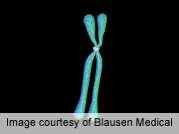(HealthDay)—Genetic mutation causing interference with encoding of hormone-sensitive lipase (HSL) results in susceptibility to metabolic disorders, according to research published online May 21 in the New England Journal of Medicine.
Jessica S. Albert, Ph.D., of the University of Maryland in Baltimore, and colleagues used genetic sequencing in Old Order Amish participants with fasting serum triglyceride levels at the lower and upper extremes of the distribution. The authors sought to identify a mutation in the gene encoding HSL, a key enzyme for lipolysis. The researchers also obtained biopsy specimens of adipose tissue from participants who were homozygous (DD genotype), heterozygous (ID genotype), or noncarriers (II genotype) for the deletion mutation.
The researchers found that carriers of the deletion mutation in the gene encoding HSL had dyslipidemia, hepatic steatosis, systemic insulin resistance, and diabetes. Absence of HSL protein, small adipocytes, impaired lipolysis, insulin resistance, and inflammation were observed in adipose tissue from participants with the DD genotype. Down-regulation of transcription factors responsive to peroxisome-proliferator-activated receptor γ and downstream target genes in those with the DD genotype was associated with altered regulation of pathways influencing adipogenesis, insulin sensitivity, and lipid metabolism.
"These findings indicate the physiological significance of HSL in adipocyte function and the regulation of systemic lipid and glucose homeostasis and underscore the severe metabolic consequences of impaired lipolysis," the authors write.
More information:
Abstract
Full Text
Journal information: New England Journal of Medicine
Copyright © 2014 HealthDay. All rights reserved.





















